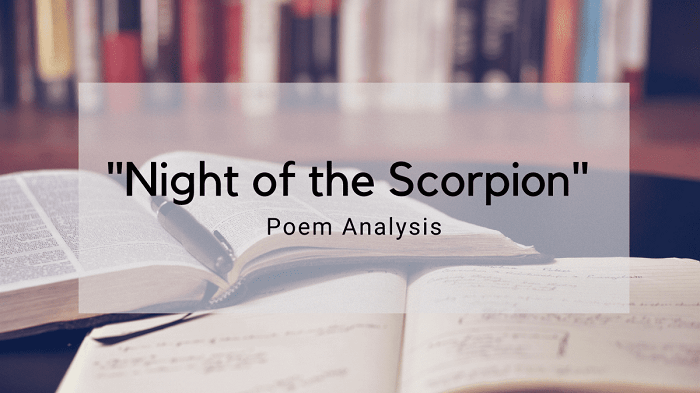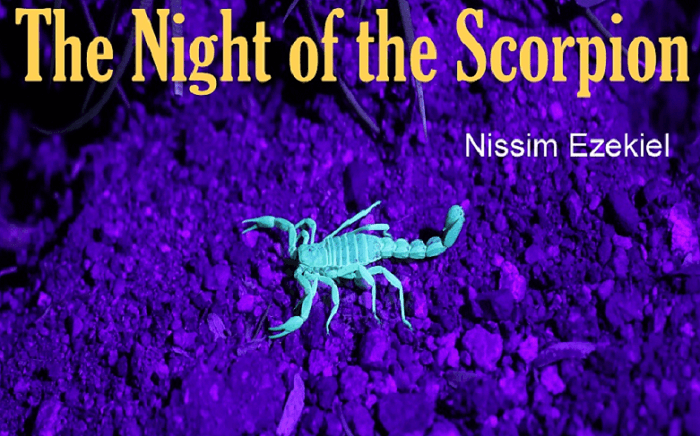Night of the Scorpion Summary and AnalysisIn this Poem, "Night of the Scorpion," the speaker tries to narrate a story from his childhood in which a scorpion bit his mother on a dark and damp night. Local natives come for assistance and effort to repel any evil spirits that may have triggered the scorpion's attack. They tried to find to scorpion, but it was an unsuccessful exercise. The pain of the mother continues. The villagers seem to believe she is being punished for the sins carried out in her previous life, and the natives wish for her purification. They prayed that her agony would balance good and evil on the globe. This will overall reduce the suffering of the world. The Poem finishes with the natives assembling around her mother and wishing that the poison will purify her body of desire and ambitious spirit. The Poet's father applied medicinal herbs to the toe, and a holy man performed his rituals. The mother started to get relief after 24 hours. As the pain decreased, she said the scorpion chose him, spared his children, and thanked the god. 
About The Poet Nissim EzekielNissim Ezekiel comes from the Jewish community and was born in Bombay. He went to Wilson College in Mumbai and got his BA degree in Literature. He continued his education at Birkbeck College, London, where his subject was philosophy. His first poetry collection was published in 1952; The Dead Man, The Bad Day, Another Book was produced in 1960. He has worked as a critic at The Names of India and as editor of Poetry India in the Publication industry. He also held academic positions at the University of Pondicherry and the University of Leeds. He received Padma Shri from the Government of India in 1988. He departed from the world in 2004 when he was 79 years old. The Setting of the PoemThe syllables such as sun-baked walls, "dark room," lanterns, and candles denote rural impression and design. After a deep analysis of the Poem, it can be said that the scorpion had not entered the house to bite his mother. The rain might not have been favorable to him. This opinion can be concluded from the Poet's line, "he risked the rain." The scorpion has come to the Poet's house due to consistent rainfall and wants to take shelter in his house. 
Scorpion, just like any animal, uses poison (venom) weapons when he feels threatened or provoked and uses them to secure himself. The scorpion might have felt threatened or provoked when the scorpion encountered the Poet's mother. The meeting with the scorpion and the mother seems to be a pure case of coincidence. Rain has also been the major factor in this case, and the scorpion hid beneath the sack of rice to protect itself from heavy rain. Sadly, it bites at the toe, leaving its mark on the mother's body. Before leaving, its "diabolic tail" emerged in the dark room. The Poet took the scorpion as an evil force and precursor of pain and misery. It is due to this; he called it "diabolic." This anger seems to be obvious because he was his son. If you notice through the prism of the son, the anger can be justified. Concerns of the NativesSoon, the tragic incident spreads to the villager and comes into the Poet's house, and he describes it as a "swarm of flies." The Poem uses a simile to describe the movement of the native. They murmured the name of the god in a low voice to calm down the effect of the venom and paralyze the evil scorpion. They thought that their chants and prayer would make the scorpion immobile. The natives also took the biting of the scorpion as an evil force that had attacked the Poet's mother. They attempted to catch the evil scorpion with candles and lanterns, but the exercise was unsuccessful. Some thought that venom would clean her past poison. The villagers seem to be ignorant of the Poet's mother's pain, and it appears that the natives were under the firm grip of superstitious beliefs and unscientific in their thought. There is no rationale in their thinking. The Approach of the Poet's Father
The Poet's father appears rational and scientific, unlike the villager, who appears unscientific and irrational. After realizing his wife's condition, he uses herb, hybrid, and power mixture to relieve the pain. He sprinkles some paraffin on the bitten toe. It is believed to relieve the pain, and the Poet appears frightened. However, applying paraffin is not an irrational approach in this case. But his action is justified, unlike whose inaction was causing more pain to the Poet's mother; at least he is doing everything to save her life. At last, the women were relieved from the excruciating pain. The Concern of Mother for Her ChildrenThe mother's feelings can be expressed with these lines and would require no further explanation: " Thank God the Scorpion picked on me/And spared my children." Structure of the PoemThe Poem contains eight stanzas, and the writing style is free verse. This meant that it did not contain a particular form of rhyme scheme. The Theme of the PoemThe Poem recalls an incident that happened in the downpour. It threw up three perspectives from the case: the natives, the father, and the mother. The night has witnessed a continuous ten-hour rain, and a scorpion has sneaked into the Poet's home to shelter from the brutal rain. The scorpion hid beneath the sack of rice. Sadly, the scorpion had come into the touch with the Poet's mother. Therefore, it bits his Poet's mother and left home. The natives came to know about the incident and left for the Poet's home immediately. When they witnessed his mother's pain, they repeated the names of the god in a low voice. They tried to search for the scorpion, but the effort went in vain. They thought that if the scorpion moved, the poison would spread faster in the body. Their opinion slightly moves and begins to say that pain will assist the Poem in cleaning his sins of the previous birth. Hindu philosophy says that a person travels through birth and death. They also believed that poison would cleanse her ambition and desire. Hindu Philosophy says that materialistic and worldly pleasures contaminate the soul. Giving up these worldly pleasures is a step toward meeting the ataman. These things seem to be irrelevant and irrational. It also appears that these natives are under the firm grip of superstitious and religious beliefs. Instead of being medically scientific and treating the lady with medical care, they seem to be less humanistic in their approach. It also presents glaring facts like a lack of medical infrastructure or basic knowledge, modern education, and science. The unavailability of doctors and medical supplies in rural areas can also be noted duly. In the age of modern science, people were treating a patient with the help of a faith leader and using irrational and ineffective methods. But there is hope in the story. The Poet's father seems irrational and scientific; his approach contradicts the rest of the people. He represents the voice of rationality in the Poem. The Poem uses a specific term to describe him "skeptic rationalist." He applied paraffin (it may be concluded this may be done out of desperation) and used herbs and a mixture of different ingredients. Any rationalist person would have thought that the approach adopted by the natives would not have helped the woman at all. Those were beliefs not backed by logic and reason. Frequent repetition of chants of religious mantras also suggests limited access to health care and poor medical awareness. What touched someone' heart and might have surprised all the readers would have been the mother's perspective. It was an interesting one. Even in the excruciating pain, she thought of her family and children.
Next TopicOn the Rule of the Road Summary
|
 For Videos Join Our Youtube Channel: Join Now
For Videos Join Our Youtube Channel: Join Now
Feedback
- Send your Feedback to [email protected]
Help Others, Please Share









